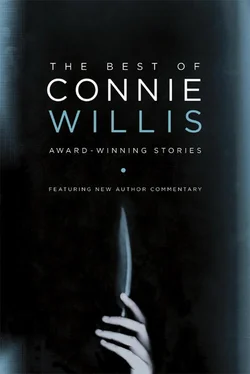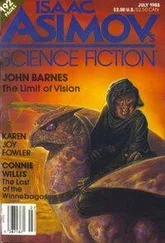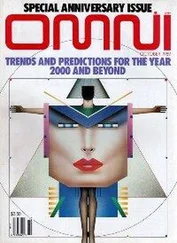But if they understood us, then that meant one of two things—they were either unwilling to talk to us or were incapable of speaking. Had their sitting down and their other responses been an attempt at sign language?
No, that couldn’t be it, either. They could have responded just as easily to a spoken “sit” and done it months earlier. And if they were trying to communicate, wouldn’t they have given Calvin and me some hint we were on the right—or the wrong—track instead of just standing there with that we-are-not-amused glare? And I didn’t believe for a moment those expressions were an accident of nature. I knew disapproval when I saw it. I’d watched Aunt Judith too many years not to—
Aunt Judith. I took my cell phone out of my pocket and called my sister Tracy. “Tell me everything you can remember about Aunt Judith,” I said when she answered.
“Has something happened to her?” she said, sounding alarmed. “When I talked to her last week she—”
“Last week?” I said. “You mean Aunt Judith’s still alive ?”
“Well, she was last week when we had lunch.”
“ Lunch? With Aunt Judith? Are we talking about the same person? Dad’s Aunt Judith? The Gorgon?”
“Yes, only she’s not a Gorgon. She’s actually very nice when you get to know her.”
“Aunt Judith,” I said, “the one who always glared disapprovingly at everybody?”
“Yes, only she hasn’t glared at me in years. As I say, when you get to know her—”
“And exactly how did you do that?”
“I thanked her for my birthday present.”
“And—?” I said. “That can’t have been all. Mom always made both of us thank her nicely for our presents.”
“I know, but they weren’t proper thank-yous. ‘A prompt handwritten note expressing gratitude is the only proper form of thanks,’” Tracy said, obviously quoting. “I was in high school, and we had to write a thank-you letter to someone for class. She’d just sent me my birthday card with the dollar in it, so I wrote her, and the next day she called and gave me this long lecture about the importance of good manners and how shocking it was that no one followed the most basic rules of etiquette anymore and how she was delighted to see that at least one young person knew how to behave, and then she asked me if I’d like to go see Les Miz with her, and I bought a copy of Emily Post, and we’ve gotten along great ever since. She sent Evan and me a sterling silver fish slice when we got married.”
“For which you sent her a handwritten thank-you note,” I said absently. Aunt Judith had been glaring because we were boorish and unmannered. Was that why the Altairi looked so disapproving, because they were waiting for the equivalent of a handwritten thank-you note from us?
If that was the case, we were doomed. Rules of etiquette are notoriously illogical and culture-specific, and there was no intergalactic Emily Post for me to consult. And I had, oh, God, less than two hours till liftoff.
“Tell me exactly what she said that day she called you,” I said, unwilling to give up the idea that she was somehow the key.
“It was eight years ago—”
“I know. Try to remember.”
“Okay… there was a lot of stuff about gloves and how I shouldn’t wear white shoes after Labor Day and how I shouldn’t cross my legs. ‘Well-bred young ladies sit with their ankles crossed.’”
Had the Altairi’s sitting down in the mall been an etiquette lesson in the proper way to sit? It seemed unlikely, but so did Aunt Judith’s refusal to speak to people because of the color of their shoes on certain calendar dates.
“… and she said if I got married, I needed to send out engraved invitations,” Tracy said. “Which I did. I think that’s why she gave us the fish slice.”
“I don’t care about the fish slice. What did she say about your thank-you note?”
“She said, ‘Well, it’s about time, Tracy. I’d nearly given up hope of anyone in your family showing any signs of civilized behavior.’”
Civilized behavior. That was it. The Altairi, like Aunt Judith sitting in our living room glaring, had been waiting for a sign that we were civilized. And singing—correction, group singing—was that sign. But was it an arbitrary rule of etiquette, like white shoes and engraved invitations, or was it a symbol of something else? I thought of Calvin telling his chattering seventh-graders to line up, and the milling, giggling, chaotic muddle of girls coming together in an organized, beautifully behaved, civilized line.
Coming together. That was the civilized behavior the Altairi had been waiting for a sign of. And they’d seen precious little of it in the nine months they’d been here: the disorganized commission with members quitting and those who were left not listening to anyone; that awful rehearsal where the basses couldn’t get the entrance right to save them; the harried shoppers in the mall, dragging their screaming children after them. The piped-in choir singing “While Shepherds Watched” might have been the first indication they’d seen—correction, heard— that we were capable of getting along with each other at all.
No wonder they’d sat down right there in the middle of the mall. They must have thought, like Aunt Judith, “Well, it’s about time!” But then why hadn’t they done the equivalent of calling us and asking us to go see Les Miz ?
Maybe they hadn’t been sure that what they’d seen—correction, heard—was what they thought it was. They’d never seen people sing, except for Calvin and those pathetic basses. They’d seen no signs we were capable of singing beautifully in harmony.
But “While Shepherds Watched” had convinced them it might be possible, which was why they’d followed us around and why they’d sat and slept and gone astray whenever they heard more than one voice, hoping we’d get the hint, waiting for further proof.
In which case we should be in the auditorium, listening to the Sing instead of in this soundproof room. Especially since the fact that their ship was getting ready to take off indicated they’d given up and decided they were mistaken after all. “Come on,” I said to the Altairi and stood up. “I need to show you something.” I shoved the table away from the door, and opened it.
On Calvin. “Oh, good, you’re here,” I said. “I— Why aren’t you in directing?”
“I announced an intermission so I could tell you something. I think I’ve got it, the thing the Altairi have been responding to,” he said, grabbing me by the arms, “the reason they reacted to Christmas songs. I thought of it while I was directing ‘Chestnuts Roasting on an Open Fire.’ What do nearly all Christmas songs have in them?”
“I don’t know,” I said. “Chestnuts? Santa Claus? Bells?”
“Close,” he said. “Choirs.”
Choirs?“We already knew they responded to songs sung by choirs,” I said, confused.
“Not just to songs sung by choirs. Songs about choirs. Christmas carols being sung by the choir, angel choirs, children’s choirs, wassailers, carolers, strike the harp and join the chorus ,” he said. “The angels in ‘Angels We Have Heard on High’ are sweetly singing o’er the plains. In ‘It Came Upon the Midnight Clear,’ all the world gives back the song they sing. They’re all about singing,” he said excitedly. “‘That glorious song of old,’ ‘whom angels greet with anthems sweet.’ Look,” he flipped through the pages of his music, pointing out phrases, “‘oh, hear the angel voices,’ ‘as men of old have sung,’ ‘whom shepherds guard and angels sing,’ ‘let men their songs employ.’ There are references to singing in songs by Randy Travis, the Peanuts kids, Paul McCartney, How the Grinch Stole Christmas . It wasn’t just that ‘While Shepherds Watched’ was sung by a choir. It was that it was a song about choirs singing. And not just singing, but what they’re singing.” He thrust the song in front of me, pointing to the last verse. “‘Goodwill, henceforth from heaven to men.’ That’s what they’ve been trying to communicate to us.”
Читать дальше












